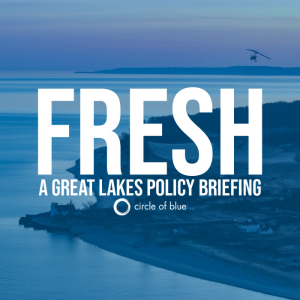This week’s episode of What’s Up With Water covers extreme weather’s toll in Pakistan, Mississippi’s dual water crises, and a legislative win for affordable water in California.
Transcript
Welcome to “What’s Up With Water” – your need-to-know news of the world’s water from Circle of Blue. I’m Eileen Wray-McCann.
Vicious cycles of extreme weather continue to claim lives and destroy infrastructure. The peril is unmistakable today in Pakistan, where heavy rains and floods have killed more than a thousand people in the last three months. The New York Times reports that waters have demolished or damaged over a million homes. Bridges, schools, hospitals, and farms have also been ruined. By some estimates, two million acres of farmland are submerged. Pakistan is beset by political instability and food shortages, and experts say this monsoon season has been the worst in recent history. According to UNICEF, more than three million children need assistance and are at risk of waterborne disease or malnutrition. Global climate changes set the stage for catastrophe, but as Circle of Blue has reported, for countries like Pakistan, many key vulnerabilities hinge on small-scale factors. Often, local conditions like the amount of pavement, the location of settlements, or community poverty are things that can turn a downpour into a flood or humanitarian disaster.
In the United States, the capital of Mississippi confronted a crisis on two fronts as the city of Jackson was hit with floods at the same time that pumps failed at its embattled drinking water system. The water system serves more than 180,000 residents in the majority Black city. It has been in disrepair for years, a casualty of rancorous racial politics in Mississippi. Residents are caught in the middle. Without a functioning water system, they waited in long lines for cases of bottled water last week. Mayor Chokwe Antar Lumumba reflected on Jackson’s longstanding drinking water struggles, which have reached a crescendo in recent years. A deep freeze in the winter of 2021 knocked out a treatment plant and resulted in months of boil-water advisories. More such advisories occurred this summer. After the latest breakdown, Mississippi Governor Tate Reeves declared a public emergency. The National Guard was called in to distribute water while crews worked to repair the water treatment plant and install temporary pumps. Jackson’s other water crisis last week was flooding. The Pearl River, which runs through the south side of the city, crested at more than 35 feet, in one of the river’s highest recorded surges in the city.
Meanwhile, in California, advocates for affordable water scored a legislative victory. Lawmakers approved a measure to establish the nation’s first state-funded program to help low-income residents pay their water and sewer bills. Low-income residents are those households earning less than 200 percent of the federal poverty line. The bill is responding to a serious need. Last year, a state survey found that Californians had water bill debts adding up to about $1 billion. Though that figure has likely decreased, the past-due burdens are still significant. A legislative analysis estimated that the assistance program could require at least $100 million annually. Funding was not part of this legislative action. Instead, discussions about money for the program will happen during the annual budget process. The bill also aims for a broad reach, targeting all of the state’s community water systems. The program will require many administrative pieces to fit together. That’s why the state’s largest water utility association opposed the measure, saying that its current design is too complicated to implement efficiently. The bill now goes to Gov. Gavin Newsom, who is expected to sign it.
And that’s “What’s Up With Water” from Circle of Blue, where water speaks. More water news and analysis await you at circleofblue.org. This is Eileen Wray-McCann – thank you for being here.
Eileen Wray-McCann is a writer, director and narrator who co-founded Circle of Blue. During her 13 years at Interlochen Public Radio, a National Public Radio affiliate in Northern Michigan, Eileen produced and hosted regional and national programming. She’s won Telly Awards for her scriptwriting and documentary work, and her work with Circle of Blue follows many years of independent multimedia journalistic projects and a life-long love of the Great Lakes. She holds a BA and MA radio and television from the University of Detroit. Eileen is currently moonlighting as an audio archivist and enjoys traveling through time via sound.







